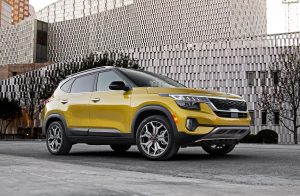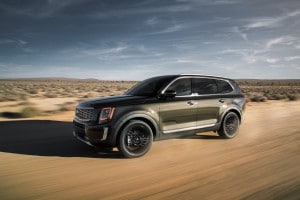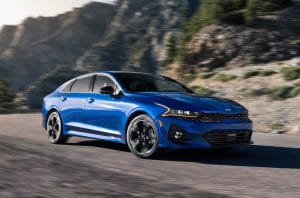
Unlike its competitors, Kia is selling at pre-pandemic levels. New products like the Seltos is helping to drive the uptick.
Analysts are predicting sales of new vehicles are continuing to improve in August, though they remain stuck below the level recorded before the COVID-19 pandemic sent the economy into a lockdown.
ALG Inc., a subsidiary of TrueCar Inc. and the industry benchmark for determining the future resale value of a vehicle, estimates total new vehicle sales will hit 1.3 million units in August 2020, down 15% from a year ago when adjusted for the same number of selling days.
“The automotive industry momentum continues in August as the industry claws back more and more new vehicle sales each month since sales bottomed out in April,” said Eric Lyman, Chief Industry analyst for ALG.
(Driving off into the sunset: models being discontinued in 2021.)
“When it comes to retail sales, we are consistently seeing that the automakers with the strongest SUV, crossover and truck line-ups coupled with healthy inventory levels are continuing to outpace the brands that do not,” he said.
Analysts from Bank of America estimate light vehicle sales in August 2020 declined 14.8% year over e year on a selling day adjusted basis, hitting a seasonally adjusted annual rate or SAAR of 14.9 million units, which compares to other industry estimates in the range of 14.5mm-15.0mm.
Following the dropoff in sales of 33% in March and 49% in April from COVID-19 and related disruptions, demand has rebounded faster than expected. Sales in May, June and July all showed marked good sequential improvement. This is likely helped by pent-up demand from shutdowns in March-April, low interest rates, OEM incentives, and states easing stay-at-home policies.
However, even with sales running higher than expected in recent months, absolute levels are still a long way off from the 2017, 2018, and 2019 pace of 17 million units and risks to the total sales level are far from completely resolved.
(EV sales slump during first half, even Tesla losing ground despite launch of Model Y.)
Much uncertainty lingers around the macroeconomic environment, and in particular, what could be second wave outbreaks later this year, as well as the potential culmination of a few government stimulus programs that helped support consumers through the worst of the crisis. Ultimately, as these factors could push out a sustainable inflection from the second half of 2020 into 2021.

Kia’s wildly popular Telluride large SUV hasn’t been posting sales increases only because of a shortage of available product.
“Used vehicle sales are actually up year-over-year, as consumers turn toward the used car market for cost savings during these uncertain economic times, and also due to some supply shortages on the new vehicle side,” added Lyman. “While this heightened demand is creating upward pressure on used retail prices, it is making it a great time for consumers to get top value on a trade in on popular used vehicles.”
Fleet sales for August 2020 are expected to be down 41% from a year ago, but up 8% from July 2020 when adjusted for the same number of selling days.
“While retail sales for most automakers are up month-over-month, Kia is setting itself apart from the pack, as one of the only automakers that is up year-over-year,” said Nick Woolard, director of OEM Analytics at TrueCar. “Most of Kia’s portfolio is back to selling at pre-COVID-19 levels. Despite the Telluride, one of their most popular models, being in short supply.”
Tesla, according to True Car, also is doing well and expects to report a sales increase for August, with market share of 1.4%.
(Auto buyers will soon have more brand choices than at any time since World War II.)
“Volkswagen is also showing strong recovery, thanks to its strong incentive offerings for consumers. While many automakers are scaling back on zero percentage offers for 84 months, Volkswagen is presenting one of the stronger programs to consumers with zero percentage financing for up to 72 months on most VW models,” added Woolard.

